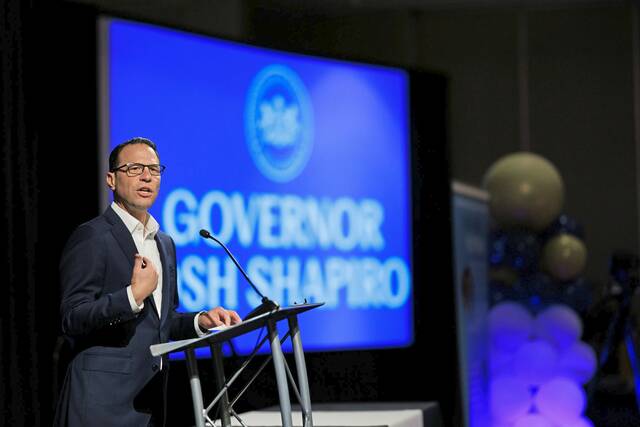Pennsylvania Gov. Josh Shapiro’s centrist profile might have cost him a spot on the Democratic presidential ticket this November in favor of a more progressive politician, experts said Tuesday.
Shapiro, considered a top contender to be Vice President Kamala Harris’ running mate during a compressed vetting process, was passed over for Minnesota Gov. Tim Walz.
Both politicians have solidly Democratic resumes.
But the party’s progressive arm likely pushed Harris away from moderate Shapiro and toward Walz, a more progressive option who better aligns with their political ideals and still boasts an ability for bipartisan dealmaking, according to experts.
“Shapiro has lots of assets and that’s why he was among the top candidates for this selection — but ultimately, the backlash that his nomination would bring among more progressive voters who have concerns about Shapiro was something that Harris didn’t want to take on,” Chris Borick, a political science professor at Muhlenburg College in Allentown, said.
Still, political observers see Walz — a charismatic politician whose down-to-earth speech, folksy demeanor and everyman appearance make him a relatable character — as able to win over voters who don’t lean far left.
Walz, 60, was a non-commissioned Army officer, public school teacher and high school football championship coach before he became a politician. He served for 12 years in the U.S. House of Representatives before he was elected governor in 2018.
‘All-American kind of guy’
Experts said there are several factors Harris likely weighed in choosing her running mate — and it’s hard to know at this point exactly why she opted for Walz over other top candidates, like Shapiro.
One simple reason may be how well Harris got along with potential running mates, said Kristen Coopie, director of pre-law at Duquesne University, who has taught various political courses.
“They’ve reportedly had a pretty cordial relationship,” Coopie said of Harris and Walz. “I think it’s refreshing for her to have somebody who will let her lead but also will be there to support her in whatever she wants to focus on.”
Harris also may have considered who could help her win key battleground states ahead of what is sure to be a tight race.
While Shapiro had been seen as a path to win Pennsylvania, Walz may boost Harris’ popularity throughout the Midwest, said Alison Dagnes, a political science professor at Shippensburg University.
Another key factor is political ideology — and that’s what may have nudged Walz past Shapiro, Dagnes said.
Shapiro is seen as a centrist Democrat, often drawing criticism from progressives for his support of taxpayer-funded private school vouchers, a concept favored more often by conservatives.
Walz, on the other end, is more progressive and in step with Harris’ political views, Dagnes said.
“If you look at the heat that Shapiro was taking from particularly the progressive wing of the party because of his stances on things like vouchers and fracking, it seems like he just wasn’t acceptable to that part of the party,” said Berwood Yost, who oversees polling at Franklin & Marshall College in Lancaster.
It’s hard to say how passing over Shapiro will resonate with voters, Dagnes said, especially among Pennsylvania’s more moderate base, where some already see Harris as too far left.
“Certainly, he’s (Walz) attractive to progressives — but those progressives were already going to vote for Harris in the first place,” Dagnes said.
Borick, the Muhlenburg College professor, said Harris may have felt Shapiro’s more moderate views were a liability — even though others felt it uniquely positioned him to win over voters who were wary of Harris’ more left-leaning policies.
Though Shapiro seemed particularly well-positioned to win over moderate voters, Walz still may have some broad appeal to bring to the Harris ticket, said Dan Mallison, associate professor of public policy and administration at Penn State Harrisburg.
“He has a lot of bipartisan dealmaking in his background, both in Congress and as a governor,” Mallison said of Walz.
Walz has succeeded in passing progressive legislation in a largely red state, Coopie said. He’s a hunter and gun owner who has passed gun control legislation, and he’s proven his ability to reach across the aisle to work with people whose political views don’t match his own.
Plus, his blue-collar background could resonate with a broad swath of voters.
“He really has been this all-American kind of guy that promotes service and country over everything else,” Coopie said. “I think that makes him appealing to some of those voters that might be looking for something a little different than what Kamala Harris brings to the table.”
Balancing the ticket
Though Walz and Harris are more alike in terms of political ideology, Walz brings “more balance in terms of background” than Shapiro, whose history as a lawyer and attorney general mimics Harris’ own experience, Mallison said.
“They (Harris and Shapiro) are not exactly the same, but they have a lot of similar background, whereas Walz spent a long time in the military as an enlisted soldier, he was a teacher and he’s been governor longer than (Shapiro),” Mallison said.
Walz also fills in certain gaps that Harris may have been looking to fill, Carnegie Mellon University professor Stacy Rosenberg said. He has military experience, something Harris lacks and Shapiro couldn’t bring to the table.
Plus, he has federal government experience, something missing from Shapiro’s resume.
Walz also can bring strong support from Muslim communities, Rosenberg said. Minnesota has many strong Muslim communities, and Walz has refrained from voicing controversial takes on the Israel-Gaza conflict that may upset those constituencies, unlike Shapiro, who has been vocal in his support for Israel.
“This decision for the selection of the vice-presidential candidate is coming on the heels of an intensification in the Middle East,” Rosenberg said. “I think that had to inform the decision.”
Many of the top choices for Harris’ running mate have thrown their support behind Israel, Rosenberg said, and Harris could face criticism by some Jewish voters for passing over Shapiro.
Good fit in Pa.
Walz likely won’t have as much of an impact in Pennsylvania as Shapiro might have had, simply because Shapiro would’ve generated more buzz in his own home state, Dagnes said.
Shapiro seemed to many like the obvious choice to round off the Democratic ticket because Pennsylvania’s critical 19 electoral votes are seen as a must-win for Harris, Dagnes said.
“I think the political hivemind thought Shapiro was the obvious safe bet,” Dagnes said. “I don’t know that picking a 60-year-old white-guy governor from Minnesota is risky.”
Though Walz doesn’t have the same connection in Pennsylvania that Shapiro does, he’s still a good fit for campaigning in the Keystone State, Borick said. Minnesota has a lot in common with Pennsylvania. Both have large rural populations with some major metro areas. Both have whiter populations than the national average. Both are northern industrial states.
“I think you’ll see he doesn’t feel alien to Pennsylvania,” Borick said of the Minnesota governor.
Just because Shapiro isn’t on the ticket doesn’t mean he won’t still help Harris in his home state, Mallison said. Shapiro is likely to be a vocal campaigner throughout Pennsylvania, and that could still help get out the vote for the Democrats.
Walz, Dagnes said, may find his own campaigning most effective with young voters. His “superpower,” she said, is communicating authentically — and sometimes going viral for it. That genuine communication style — praised Tuesday by former President Barack Obama — often resonates with young voters.
Walz recently garnered national attention for coining the term “weird Republicans,” which Democrats quickly popularized as a way to criticize their opponents.
“I think there’s been success with the down-home, more relatable candidates, particularly to attract Republican voters in middle America,” Rosenberg said. “We have a candidate who was a football coach and a teacher, who served in the military, who is more casual in dress and word choice. That may speak to the people he’s representing more than Shapiro’s more business-oriented persona.”
Taken by surprise
None of the candidates who were in the running for vice president brought the whole package, Mallison said. Everyone offered something different, and it was up to Harris to decide what to prioritize.
But Yost said he was surprised by Harris’ choice. He thought Shapiro was the likely pick, largely because he could help garner votes in his home state of Pennsylvania, a crucial swing state Harris is hoping to clinch on her road to the White House.
Shapiro has won several Pennsylvania counties where other Democrats, including Biden, have struggled — and he may have helped swing those hotly contested areas for Harris, Yost said.
“Given the value and importance of Pennsylvania, it feels a little surprising that someone who is as popular as Shapiro would be passed over for the job,” Yost said.
Walz wasn’t initially seen as among the top options, Coopie said.
It was after making waves with the “weird Republicans” remark that Walz began to be considered a real contender for Harris’ running mate, Coopie said.
“It’s the dark horse, late-to-the-game guy that took us all by surprise,” she said.








